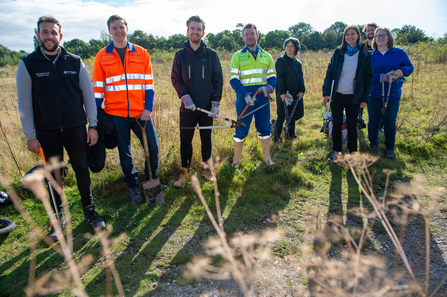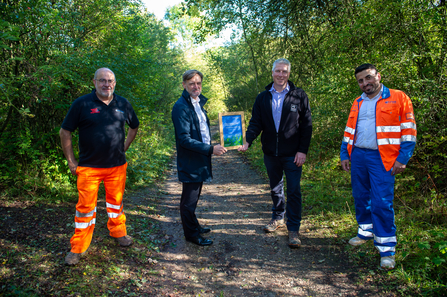A work party from British Gypsum and Formula employees (part of the Saint-Gobain Group) joined Nottinghamshire Wildlife Trust employees and volunteers last week (October 6th ) to carry out key conservation work at the Beacon Hill Conservation Park to celebrate the 20th anniversary of its transfer to the Nottinghamshire Wildlife Trust by British Gypsum. The working party carried out footpath management work and hedge cutting along with a general tidy up of the popular reserve for the local wildlife and community to continue to enjoy. The community can now also take a rest on the three newly installed benches kindly donated by Saint-Gobain Formula and installed by the work party.
Saint-Gobain employee work party marked 20th anniversary of Beacon Hill donation to Nottinghamshire Wildlife Trust

The work party at Beacon Hill, including Saint-Gobain Group employees and Nottinghamshire Wildlife Trust employees and volunteers
The area was originally owned, mined and quarried for gypsum by the Cafferata company in the first of part of the last century. It was later acquired through British Gypsum ownership. Newark Town Council and Nottinghamshire County Council also used part of the excavations as a landfill site. When the landfilling operations were completed, part of the original site was sold and transformed into the Industrial Estate which is adjacent to the reserve. British Gypsum was aware of the environmental value of the remaining area of the site and worked with EMEC Ecology, the consultancy company of the Nottinghamshire Wildlife Trust, to make a full assessment of the area's wildlife value and to draw up detailed proposals. Following discussions between British Gypsum, Newark and Sherwood District Council and the Trust, plans to create the Beacon Hill Conservation Park were agreed and the land was donated to the Trust in 2001 along with £800,000 to fund the development and management of the land.
Beacon Hill Conservation Park, located near Newark is one of the Nottinghamshire Wildlife Trust’s nature reserves located across Nottinghamshire. The 45-acre reserve consists of an extensive network of habitats of significant wildlife value including scrub, woodland, hedgerows and grassland. The large central area of the reserve - previously a landfill site - has been restored as a wildflower meadow with a wood gulley at the southern edge. The reserve is home to a wide range of biodiversity with notable species found on the site such as fox, buzzard, kestrel, tree creeper, skylark, meadow pipit. Amongst the flora species, ash, field maple, hawthorn, pedunculate oak, cow parsley, field horsetail, hedge woundwort, hoary ragwort, primrose, red clover, white clover, wild clematis, wild parsnip, and yarrow. Moth species include Fern, Haworth’s pug, marbled coronet, cream wave and scorched wing are also spotted there.

Paul Wilkinson, Chief Executive of Nottinghamshire Wildlife Trust presenting the certificate of Business Partnership to Richard Batley, HR and CSR Director of Saint-Gobain UK & Ireland
Richard Batley, HR and CSR Director, Saint-Gobain UK & Ireland was part of the celebratory working party at the reserve. He said: “It’s been a pleasure to come and experience the reserve 20 years on since British Gypsum gifted the site to Nottinghamshire Wildlife Trust. We are pleased to continue to support this important and proactive wildlife charity, both through our corporate partnership and through our teams getting involved in many volunteering days of action like today. We look forward to seeing Beacon Hill Reserve continue to evolve and be an attractive place for both wildlife and local residents to visit.”
NWT’s Business Partnerships Officer Emily Patrick added…” It’s wonderful to see how far the site has come in the last 20 years and fantastic that Saint-Gobain and British Gypsum continue to support the reserve and our Trust by getting involved through employee activities to help improve it for both Wildlife and the local community to thrive.”
Find out more
For further information about Business Partnerships, visit our webpage or contact Emily Patrick, Business Partnerships Officer.
